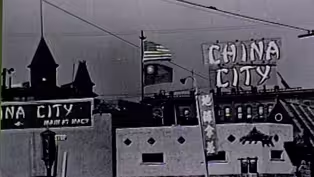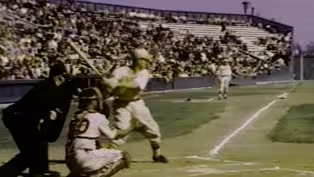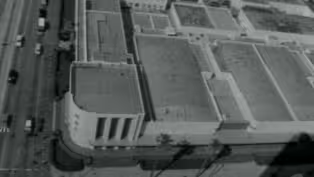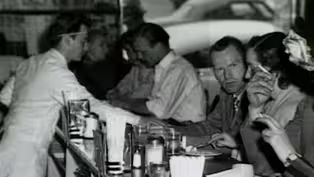
The Cocoanut Grove
Clip: Episode 3 | 6m 32sVideo has Closed Captions
For 68 years, the Cocoanut Grove at the Ambassador Hotel was a lavish, 24-acre nightclub.
The Cocoanut Grove at the Ambassador Hotel on Wilshire Boulevard was a lavish, 24-acre nightclub that was open from 1921 to 1989. It was an important venue for performers like Bing Crosby, Ray Charles, Barbara Streisand, Dean Martin, Harry Belafonte, Judy Gardland and Diana Ross. It hosted the oscars multiple times, as well as celebrity-filled parties.
Problems playing video? | Closed Captioning Feedback
Problems playing video? | Closed Captioning Feedback
Things That Aren't Here Anymore is a local public television program presented by PBS SoCal

The Cocoanut Grove
Clip: Episode 3 | 6m 32sVideo has Closed Captions
The Cocoanut Grove at the Ambassador Hotel on Wilshire Boulevard was a lavish, 24-acre nightclub that was open from 1921 to 1989. It was an important venue for performers like Bing Crosby, Ray Charles, Barbara Streisand, Dean Martin, Harry Belafonte, Judy Gardland and Diana Ross. It hosted the oscars multiple times, as well as celebrity-filled parties.
Problems playing video? | Closed Captioning Feedback
How to Watch Things That Aren't Here Anymore
Things That Aren't Here Anymore is available to stream on pbs.org and the free PBS App, available on iPhone, Apple TV, Android TV, Android smartphones, Amazon Fire TV, Amazon Fire Tablet, Roku, Samsung Smart TV, and Vizio.
Providing Support for PBS.org
Learn Moreabout PBS online sponsorshipSo, now the sun is going down, the stars are coming out, and it's time to have a ball.
But do you realize how few people have ever been to a real ball with ball gowns and corsages and tuxedos and patent leather?
And it wasn't just Saturday night.
Every night of the week, in ballrooms all over Los Angeles, young men could foxtrot together with their first love, step together, step.
They really were a way of life at night, but I'd hate to make a living trying to sell dance wax and corsages these days.
What really isn't here anymore is that high-spending brother-in-law of the ballroom, the nightclub.
A nightclub is really just a small, fancy ballroom with a restaurant to serve you food and a floor show to entertain you while you eat, and Los Angeles had the biggest, the best, the most famous, and the most expensive.
And the nightclub that was all of that and more was the Cocoanut Grove at the Ambassador Hotel.
Jack: Now, as you entered the Cocoanut Grove, it really was a grove of coconuts, and not fake-looking coconut trees.
They were really good-looking.
Everything was done in magnificent taste, and then a big stairway down to the dance floor, boxes all along the side.
Up on the top, there were more boxes and then tables all around.
The Cocoanut Grove was not a big barn.
It was a gorgeous place.
You came in, parked your car, then came through a series of beautiful shops.
In fact, you could blindfold me, and I wouldn't know what town I was in, and you walk me through those shops, and I'd say, "I'm in the Ambassador."
[Big-band music playing] On the casino floor, which was directly across from the Cocoanut Grove, one of the places that was occupied by the Blue Book models of Hollywood.
Now, anybody that thought they had photographic qualities and things like that could enroll in this school.
And if there was anything good about you in connection with entertainment, this lady was able to bring it out.
[Big-band music playing] Ralph: On every Sunday afternoon, an amateur photographer grabbed his movie camera and came back with more than just pretty pictures.
Leo: One girl was particularly very cooperative.
She just wanted to do anything I said, like I was a big-time director.
Here I was a nobody.
And this was in 1942, and that girl was Norma Jean Dougherty.
A lot of people have claimed that they discovered Marilyn Monroe.
Well, in 1942, this is a frame enlargement of my movie.
And that's her at 16.
Ralph: But when the bathing beauties paraded offstage, the Cocoanut Grove would come alive with Freddy Martin or Gus Arnheim or Bing Crosby and The Rhythm Boys.
Jack: I sang in glee club in Hollywood High, and three of us got together and imitated The Rhythm Boys at the Cocoanut Grove, and the Cocoanut Grove, in those days, was the number-one place in the world at which to sing, and, of course, stars galore.
Ralph: And it just so happened that the place in the world in which to sing was holding auditions.
Jack: So, we went over and tried out with all the others, and my mother said, "Now, don't be disappointed if you don't get the job," because I'd never made more than $5.00 from my dad for mowing the lawn and things like that.
And I came back, and she said, "Now, I know how impressed "you are and discouraged probably you are about now."
I said, "No, no.
"We got the job.
"We start next Monday, "and I'm gonna make a hundred dollars a week."
In those days, a hundred dollars, wow.
I'm telling you, the night we opened at the Cocoanut Grove-- and we called ourselves The Three Ambassadors for the Ambassador Hotel.
The night we opened, it held about 800.
We had 1,600 kids from Hollywood High School that night.
I could do no wrong.
[Music playing] Emcee: Here is music by Martin.
Jack: People at the Cocoanut Grove didn't come to dance.
They came to sway.
You couldn't dance.
There were too many people on the floor.
[Music playing] This was a tremendously romantic time.
[Music playing] Emcee: Yes, ladies and gentlemen, here truly is music by Martin.
Freddy Martin, his singing saxophone and orchestra broadcasting from fashionable Cocoanut Grove in the world-famous Ambassador Hotel, located on Wilshire Boulevard in Los Angeles, California.
Jack: When you would come to the Grove, they would dance by the bandstand if Phil was there and say, "Phil, would you play 'Rose Room'?"
which would happen to be his theme.
That's our theme.
They loved it, you know.
I think the times dictated an awful lot of wonderful things.
People, uh... were a little different.
I'm gonna say they're far different than they are now.
Leo: I wish somebody would have tapped me on the shoulder and says, "Leo, these are the good old days."
And I would say, "Well, you're kidding, aren't you?"
[Music playing] Ralph: For decades, the Ambassador Hotel and the Cocoanut Grove were the signature way to live it up in Los Angeles.
The music played on and on until January 2, 1989, when they finally closed their doors, and the big-band music stopped.
Today, the Ambassador Hotel is still there, but it's an empty monument, reminding us of a glorious period of Los Angeles history.
Video has Closed Captions
Clip: Ep3 | 2m 18s | China City lasted from 1938 to 1948, a themed zone following the example of Olvera Street. (2m 18s)
Video has Closed Captions
Clip: Ep3 | 3m 22s | Earl Gilmore made his mark in L.A. with Gilmore Oil, Gilmore Field, and Gilmore Stadium. (3m 22s)
Video has Closed Captions
Clip: Ep3 | 1m 57s | From 1938 to 1964, NBC had its L.A. headquarters at the corner of Sunset & Vine. (1m 57s)
Video has Closed Captions
Clip: Ep3 | 3m 54s | Opened in 1932, Schwab's Pharmacy was a famous Hollywood meeting place. (3m 54s)
Providing Support for PBS.org
Learn Moreabout PBS online sponsorshipSupport for PBS provided by:
Things That Aren't Here Anymore is a local public television program presented by PBS SoCal



















